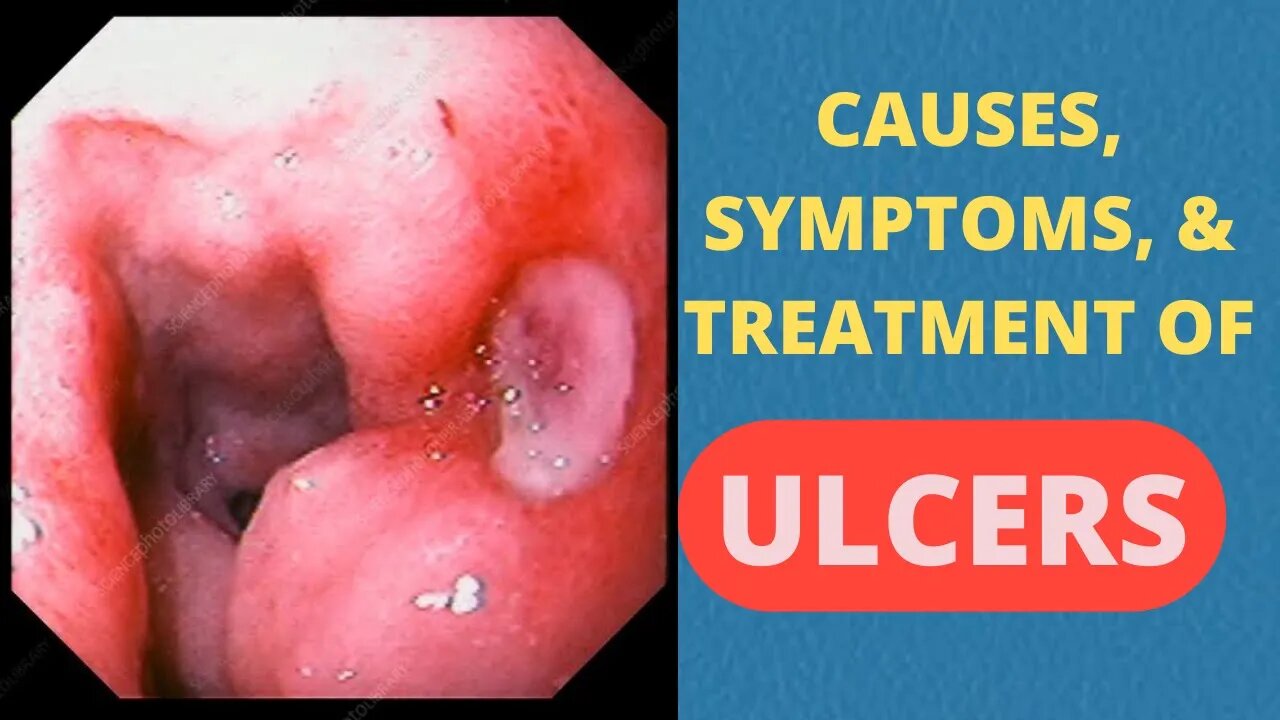Premium Only Content

Causes, Signs and Symptoms, Diagnosis and Treatment. of ulcers
Causes, Signs and Symptoms, Diagnosis and Treatment. of ulcers
✅ Introducing TEA BURN, the world’s first and only natural proprietary, patent-pending formula, that when combined with tea, can increase both the speed and efficiency of metabolism. While instantly boosting your health, energy, and well-being at the same time. Click on the link ✅ http://bit.ly/3662RmL to learn more
✅ What is a stomach ulcer?
Stomach ulcers, which are also known as gastric ulcers, are painful sores in the stomach lining. Stomach ulcers are a type of peptic ulcer disease. Peptic ulcers are any ulcers that affect both the stomach and small intestines.
Stomach ulcers occur when the thick layer of mucus that protects your stomach from digestive juices is reduced. This allows the digestive acids to eat away at the tissues that line the stomach, causing an ulcer.
Stomach ulcers may be easily cured, but they can become severe without proper treatment.
✅ What causes stomach ulcers?
Stomach ulcers are almost always caused by one of the following:
an infection with the bacterium Helicobacter pylori (H. pylori)
long-term use of nonsteroidal anti-inflammatory drugs (NSAIDs), such as aspirin, ibuprofen, or naproxen
✅ Symptoms of stomach ulcers
A number of symptoms are associated with stomach ulcers. The severity of the symptoms depends on the severity of the ulcer.
The most common symptom is a burning sensation or pain in the middle of your abdomen between your chest and belly button. Typically, the pain will be more intense when your stomach is empty, and it can last for a few minutes to several hours.
✅ Other common signs and symptoms of ulcers include:
✅dull pain in the stomach
✅ weight loss
✅not wanting to eat because of pain
✅ nausea or vomiting
✅ bloating
✅ feeling easily full
✅ burping or acid reflux
✅ heartburn, which is a burning sensation in the chest)
✅dark, tarry stools
✅ vomit that’s bloody or looks like coffee grounds
Talk to your doctor if you have any symptoms of a stomach ulcer. Even though discomfort may be mild, ulcers can worsen if they aren’t treated. Bleeding ulcers can become life-threatening.
✅How are stomach ulcers diagnosed?
Diagnosis and treatment will depend on your symptoms and the severity of your ulcer. To diagnose a stomach ulcer, your doctor will review your medical history along with your symptoms and any prescription or over-the-counter medications you’re taking.
To rule out H. pylori infection, a blood, stool, or breath test may be ordered. With a breath test, you’ll be instructed to drink a clear liquid and breathe into a bag, which is then sealed. If H. pylori are present, the breath sample will contain higher-than-normal levels of carbon dioxide.
Other tests and procedures used to diagnose stomach ulcers include:
✅ Barium swallow: You drink a thick white liquid (barium) that coats your upper gastrointestinal tract and helps your doctor see your stomach and small intestine on X-rays.
✅Endoscopy (EGD): A thin, lighted tube is inserted through your mouth and into the stomach and the first part of the small intestine. This test is used to look for ulcers, bleeding, and any tissue that looks abnormal.
Endoscopic biopsy: A piece of stomach tissue is removed so it can be analyzed in a lab.
✅Treating stomach ulcers
Treatment will vary depending on the cause of your ulcer. Most ulcers can be treated with a prescription from your doctor, but in rare cases, surgery may be required
It’s important to promptly treat an ulcer. Talk to your doctor to discuss a treatment plan. If you have an actively bleeding ulcer, you’ll likely be hospitalized for intensive treatment with endoscopy and IV ulcer medications. You may also require a blood transfusion.
✅ Nonsurgical treatment
If your stomach ulcer is the result of H. pylori, you’ll need antibiotics and drugs called proton pump inhibitors (PPIs). PPIs block the stomach cells that produce acid
In addition to these treatments, your doctor may also recommend:
✅ H2 receptor blockers (drugs that also block acid production)
✅ stopping use of all NSAIDs
✅ follow-up endoscopy
✅ probiotics (useful bacteria that may have a role in killing off H. pylori)
✅ bismuth supplement
Symptoms of an ulcer may subside quickly with treatment. But even if your symptoms disappear, you should continue to take any medication prescribed by your doctor. This is especially important with H. pylori infections, to make sure that all bacteria are eliminated.
✅ Surgical treatment'
In very rare cases, a complicated stomach ulcer will require surgery. This may be the case for ulcers that:
✅continue to return
✅ don’t heal
✅ bleed
✅ tear through the stomach
✅ keep food from flowing out of the stomach into the small intestine
Surgery may include:
✅ removal of the entire ulcer
✅ taking tissue from another part of the intestines and patching it over the ulcer site
✅ tying off a bleeding artery
✅ cutting off the nerve supply to the stomach to reduce the production of stomach acid
-
 1:29:15
1:29:15
Simply Bitcoin
4 hours ago $4.24 earnedThey JUST Triggered A Global Gold Rush: $1M Bitcoin is coming! | EP 1184
41.8K12 -
 1:50:47
1:50:47
The Quartering
4 hours agoElon Musk's 13th Baby, Trump Attends Daytona 500, and Ramaswamy Enters the Ohio Governor's Race
68.4K27 -
 1:28:04
1:28:04
Russell Brand
4 hours agoBREAKING: UK Troops To Ukraine | Zelensky Wants “Army Of Europe” | JD Vance SLAMS EU Tyranny – SF538
112K45 -
 1:46:20
1:46:20
Benny Johnson
5 hours agoPANIC: Feds FLEE DC After Mass PURGE, Fired USAID Activists EXPOSED | Trump DOMINATES Daytona 500
113K112 -
 1:58:43
1:58:43
The Charlie Kirk Show
4 hours agoCBS Steps In It + Hockey Brawl + Judicial Standoff | Yoo, Schlapp, BigTree | 2.17.2025
103K33 -
 1:01:26
1:01:26
The Dan Bongino Show
7 hours agoTrump Is Cancelling DEI And Cancel Culture (Ep. 2424) - 02/17/2025
779K1.58K -
 1:06:12
1:06:12
Timcast
6 hours agoDemocrat Swamp IMPLODES, CBS Runs DAMAGE Control For Democrats, Gets ROASTED By Elon | Timcast LIVE
146K169 -
 2:00:58
2:00:58
RealAmericasVoice
12 hours agoWAR ROOM WITH STEVE BANNON AM EDITION
123K21 -
 2:59:47
2:59:47
Wendy Bell Radio
11 hours agoAmerica Drops The Gloves
116K65 -
 1:22:27
1:22:27
Steven Crowder
7 hours agoGeorge Washington, Our First President | 3 in 3 Special
321K235